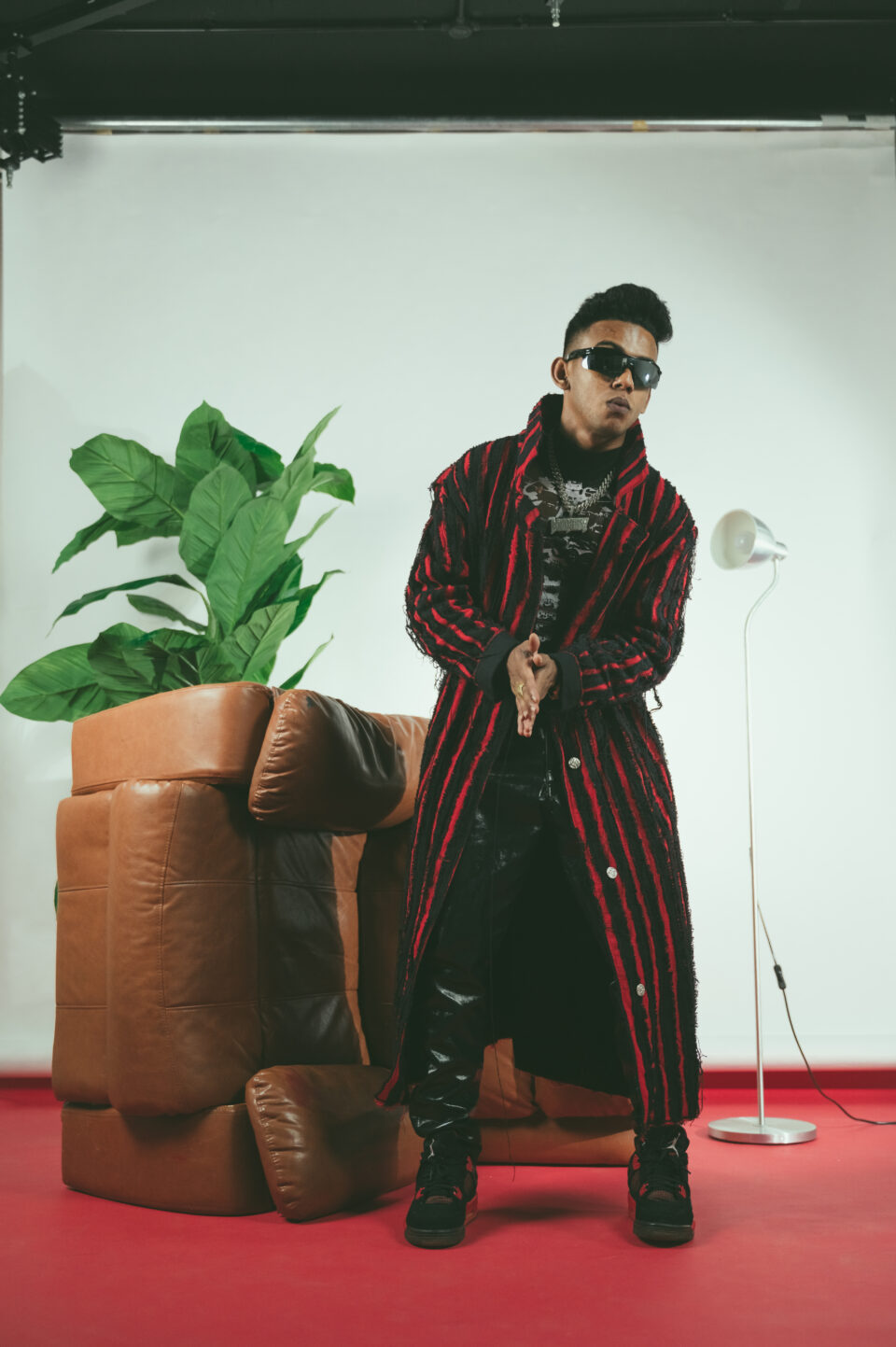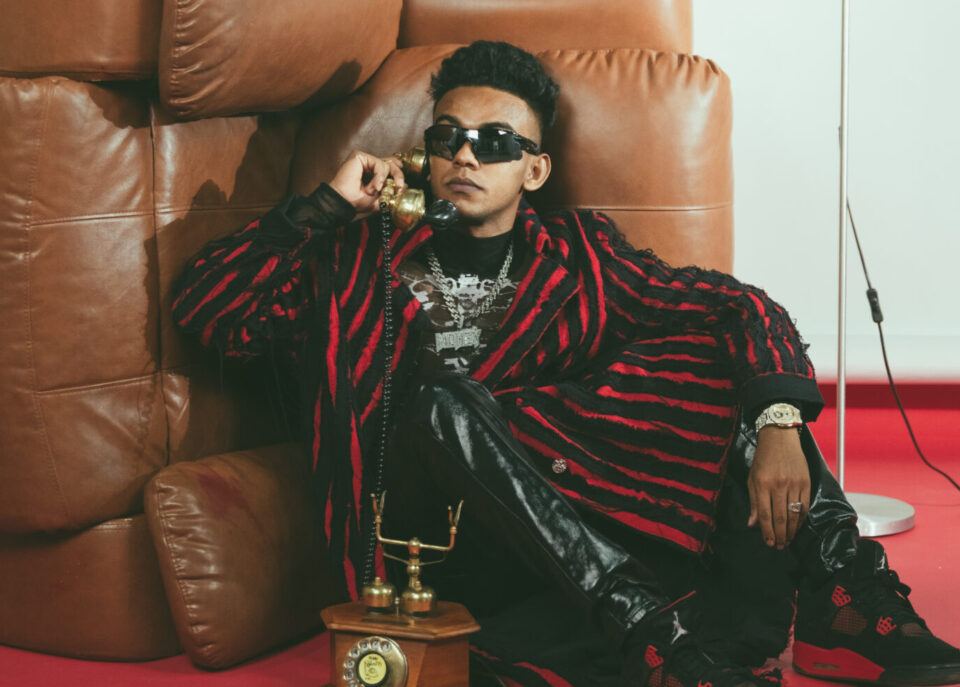
Baby Jean
Empowering south-side youth through his music
Originally from Othalur in the Malappuram district of Kerala, Baby Jean introduces a unique angle to the Indian music scene by blending hip-hop with regional elements. Making a splash in 2023 with his widely acclaimed tracks “Bandana” and “Thalakkanam,” the 23-year-old artist has experienced a meteoric rise. Within just a year, Baby Jean has amassed over one million monthly listeners on Spotify, an impressive feat considering his discography comprises only seven tracks thus far.
Rolling Stone India had the privilege of engaging in an exclusive conversation with the artist, delving into his journey as an emerging rapper, his deal with Mass Appeal India, and the intricacies of his music-making process.
Rolling Stone India: Baby Jean, what inspired you to pursue a career as a rapper? How did your upbringing and early exposure to music influence this decision?
Baby Jean: Growing up, art was an integral part of my life. While in college, my interest leaned toward directing movies, and I even collaborated on a short film. Initially, I never envisioned myself as a musician or rapper. My introduction to music came from my mother, who aspired to be a singer with her melodious voice.
Congratulations on signing with Mass Appeal India. It’s an impactful achievement. How does it feel?
Hailing from Othalur, a small village in the Malappuram district of Kerala, India, where art isn’t widely appreciated or encouraged as a career path, this opportunity means a lot to me. When my music gained recognition in the South, the chance to join Mass Appeal—an international label—was truly one of the highlights of my life. I take great pride in this collaboration. I’m particularly grateful to Ranbir Kapoor, the senior A&R at Mass Appeal, for having the foresight to include me in this venture alongside other talented artists from Kerala. It’s a monumental step.
Singing in my native language (Malayalam) and partnering with Mass Appeal opens doors to sharing our music and culture with a broader international audience. This aspect of the collaboration feels like a remarkable achievement to me.
Your hard-hitting hip-hop and drill style in Malayali vernacular has gained recognition across Southern India. What inspired you to blend these genres with your regional language?
I’ve come across many artists keeping to their roots and slang and tying their culture with the craft they do, so that has always been an inspiration. And when I’m thinking from that core, I’ve understood that ‘you perform your best in a language you’re used to and its easier to put the culture you are brought up in into words since you’re living it’ so that honesty of experience has always been a driving factor when it comes to inspiration, the delivery of the art is more beautiful and raw that way.
Every community has its own unique slang and modes of expression. When I wrote my first song, I discovered that my words flowed more naturally in my own dialect, so I embraced it. Malayalam, in its essence, is a beautiful language, and the way its words intertwine creates a captivating rhythm that speaks to me. In fact, throughout my journey as an artist, I’ve been fortunate to have my songs embraced by people, which serves as inspiration in itself.

Your tracks “Thalakkanam” and “Bandana” are both incredibly infectious rap records. Could you share the inspiration behind these tracks and what message you aimed to convey through them?
“Bandana” is deeply rooted in my passion for fashion, which has always been a means of self-expression for me. Before delving into mainstream rap, I explored fashion and costume design. The track speaks to a broader audience while keeping fashion at its core. As I wrote the song, my focus was on the importance of maintaining motivation and not losing sight of one’s goals, regardless of the challenges faced. It’s about persevering towards your aspirations, even when circumstances seem dire. While references to brands like “Jordans” and “Bandana” may seem like mere flexing, they actually symbolize my commitment to holding onto my identity and vision for success, even in tough times.
Its not about the flexing of the Jordans or the Bandana, it was my reality at the time, regardless of how worse the situation gets I won’t lose grip of my identity and my vision to succeed, and since I’m into fashion that’s how I treated the lyrics of the song, to keep persisting.
“Thalakkanam” on the other hand encompasses a diverse range of themes. It’s a homage to my hometown, intertwining themes of achievement and cultural heritage. The song also touches upon societal divisions and the importance of rising above them, focusing instead on collective progress. It’s a call to action, urging listeners to work hard towards a shared vision for positive change.
Both tracks reflect my personal experiences and beliefs, offering listeners a glimpse into my world and the values that drive me as an artist.
What challenges have you faced as a South Indian hip-hop artist breaking into the mainstream scene, and how have you overcome them?
Breaking into the mainstream was not my primary goal; instead, I focused on pursuing art forms that excited me. I don’t confine myself solely to rap; rather, I explore various styles and continue to experiment with different mediums to express my creativity. I never aimed to sound commercial or chase mainstream success; I simply stayed true to my style, and everything else naturally followed suit.
For instance, my latest single “Kaayi” was written long before [my 2023 track] “Bandana.” I deliberately avoided altering its content to fit a commercial mold or succumbing to the pressures of time. I released it as originally intended, staying faithful to my vision.
I find fulfillment in being at the forefront of the music industry and witnessing the impact my music has on my audience. Moreover, I’ve always sensed a spirit of collaboration among my fellow artists rather than competition. It’s gratifying to see us collectively riding our own wave and making strides in our respective creative journeys.
Could you walk us through your creative process when crafting a new track? How do you approach writing lyrics and selecting beats?
When it comes to selecting beats, it’s all about the excitement factor for me. I trust my instincts after listening to a beat a couple of times. If it hits me and evokes a certain feeling, I go with it. It’s not a process that requires too much deliberation. Once I have a beat that speaks to me, I usually have a topic or subject matter already in mind to build upon. I then see how the beat complements the flow of lyrics I have in mind and work towards that. It’s a fluid process.
What’s crucial for me is that the topic or story I’m writing about has a clear beginning and end within the song. I don’t spend too much time on the writing process. Once I have a subject to focus on, I delve into it from all angles, infusing it with emotions and perspectives that feel authentic to me. The goal is to keep it raw and true to my experiences and insights.

Collaborations are a big part of the hip-hop scene. Are there any artists, producers, or creatives you’re particularly eager to collaborate with in the future?
At the moment, my priority is to develop my own unique sound and create more music independently. I’m not actively seeking features on my solo projects right now. However, I’m open to collaborations when the timing feels right and the quality is exceptional. I believe in waiting for the opportune moment on this journey.
One thing though, there are several collaborations lined up for the coming year where I’ll be featured. I’m genuinely excited about these opportunities and can’t wait for them to be released.
How do you balance staying true to your roots while also evolving as an artist and exploring new sounds?
For me, maintaining authenticity has never been a struggle. It’s ingrained in who I am, and incorporating my experiences, ideas, and emotions into my music feels natural and fulfilling. Balancing this authenticity with evolution as an artist is a seamless process, as it aligns with the lifestyle I’ve lived and the values I hold dear.
I find that I don’t stray far from what feels genuine and comfortable to me, whether it’s in the sounds I explore or the flows I employ. Instead, I focus on refining and improving upon the elements that already connect with me. This ongoing process of growth allows me to channel my energy into each song, ensuring that it remains true to my roots while also showcasing my progression as a rapper.
This one is something I may be asking all your artists featured in this campaign – what gives you hope about the future of music and what worries about the future of music in India?
Music has always served as a powerful means of expression, offering hope and inspiration to listeners across generations. With sincere and impactful lyrics, it has the potential to catalyze positive change in society. This ability to inspire and uplift others fills me with hope for the transformative role that music will continue to play in people’s lives. I’m grateful for the platform I have to share my thoughts and aspirations through my music, to inspire others along the way.
Personally, I don’t dwell too much on worries about the future of music. Like with anything else, there are both positive and negative aspects to consider. Instead, I choose to focus on what I enjoy and what brings value to my life. I’m more excited about the journey ahead and the endless possibilities for creativity and exploration in music. That’s where my attention lies.




